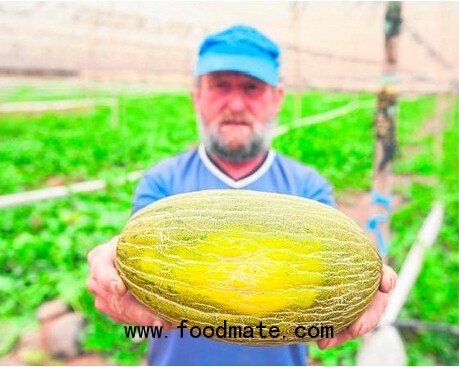
The Trigo brothers come from the municipality of Villaconejos, the place where Spain's sweetest and juiciest melons are grown. They established a farm in El Burrero, in Ingenio (Canary Islands), after the success of their first harvest, which amounted to 300,000 kilos. They hope for a repeat next Christmas with what would be the only second melon harvest within a year for the country. The climate and soil are key aspects. The fruit is exported to the Peninsula and the Netherlands.
The Repsol Guide devotes a large section to the melons produced in Villaconejos, a municipality in Madrid, rated for their High Gastronomic Quality and considered the sweetest and juiciest in Spain. Now this fruit's seeds are also planted just 20 metres from the beach of El Burrero, in the town of Ingenio, and it is precisely the soil's high sand content what ensures the fruit's exceptional sweetness. It is a key aspect, in addition to the warm climate, for the success of the experiment carried out by the company Hermanos Trigo, which started just three months ago.
In this period, they have obtained the first 300,000 kilo harvest of Piel de Sapo melons on 18 hectares, working with 15 local labourers. The idea is to expand to 40 hectares, reach one million kilos and double the number of workers. A part of the production will stay in the Canary Islands, but most will be exported to the Peninsula, the Netherlands and the United Kingdom.
Manuel Trigo, general manager of the family firm and head of the farm in El Burrero, explains that they chose Ingenio to expand the business mainly because of the warm weather, "which will allow us for the first time in history to harvest two crops in the same year, something unthinkable until now for a crop like this, that needs heat."
Manuel moved with his wife, Juliana Rubio, leaving their 4 children, already grown up and with their lives sorted out, back in Villaconejos. "And we are never going back," he laughs, referring to the mild climate and the "friendliness" of the local people and Canarians in general.
In fact, expansion plans for the farm are already underway, as explained by Rubén Trigo. The experience has also been successful from a financial standpoint, since sea transport is cheaper than land transport, he explains.
Of the 300,000 kilos already harvested, a percentage has already been sold in Spar and Hiperdino supermarkets. The rest is exported to the Peninsula and the smaller pieces go to the Netherlands and the UK.
Using a digital refractometer, Manuel picked a melon at random to show the sugar levels of the small pieces shipped to the Netherlands. It scored a top rate of 15%, "while the EU only requires a minimum of 10%." According to a study conducted by the Madrid Institute for Research and Rural Development, Villaconejos melons are the sweetest and juiciest in the country, but they are also really healthy, as they contain only 28 kcal per 100 grams, 95% water and are a source of vitamin C and potassium.
The Repsol Guide devotes a large section to the melons produced in Villaconejos, a municipality in Madrid, rated for their High Gastronomic Quality and considered the sweetest and juiciest in Spain. Now this fruit's seeds are also planted just 20 metres from the beach of El Burrero, in the town of Ingenio, and it is precisely the soil's high sand content what ensures the fruit's exceptional sweetness. It is a key aspect, in addition to the warm climate, for the success of the experiment carried out by the company Hermanos Trigo, which started just three months ago.
In this period, they have obtained the first 300,000 kilo harvest of Piel de Sapo melons on 18 hectares, working with 15 local labourers. The idea is to expand to 40 hectares, reach one million kilos and double the number of workers. A part of the production will stay in the Canary Islands, but most will be exported to the Peninsula, the Netherlands and the United Kingdom.
Manuel Trigo, general manager of the family firm and head of the farm in El Burrero, explains that they chose Ingenio to expand the business mainly because of the warm weather, "which will allow us for the first time in history to harvest two crops in the same year, something unthinkable until now for a crop like this, that needs heat."
Manuel moved with his wife, Juliana Rubio, leaving their 4 children, already grown up and with their lives sorted out, back in Villaconejos. "And we are never going back," he laughs, referring to the mild climate and the "friendliness" of the local people and Canarians in general.
In fact, expansion plans for the farm are already underway, as explained by Rubén Trigo. The experience has also been successful from a financial standpoint, since sea transport is cheaper than land transport, he explains.
Of the 300,000 kilos already harvested, a percentage has already been sold in Spar and Hiperdino supermarkets. The rest is exported to the Peninsula and the smaller pieces go to the Netherlands and the UK.
Using a digital refractometer, Manuel picked a melon at random to show the sugar levels of the small pieces shipped to the Netherlands. It scored a top rate of 15%, "while the EU only requires a minimum of 10%." According to a study conducted by the Madrid Institute for Research and Rural Development, Villaconejos melons are the sweetest and juiciest in the country, but they are also really healthy, as they contain only 28 kcal per 100 grams, 95% water and are a source of vitamin C and potassium.







